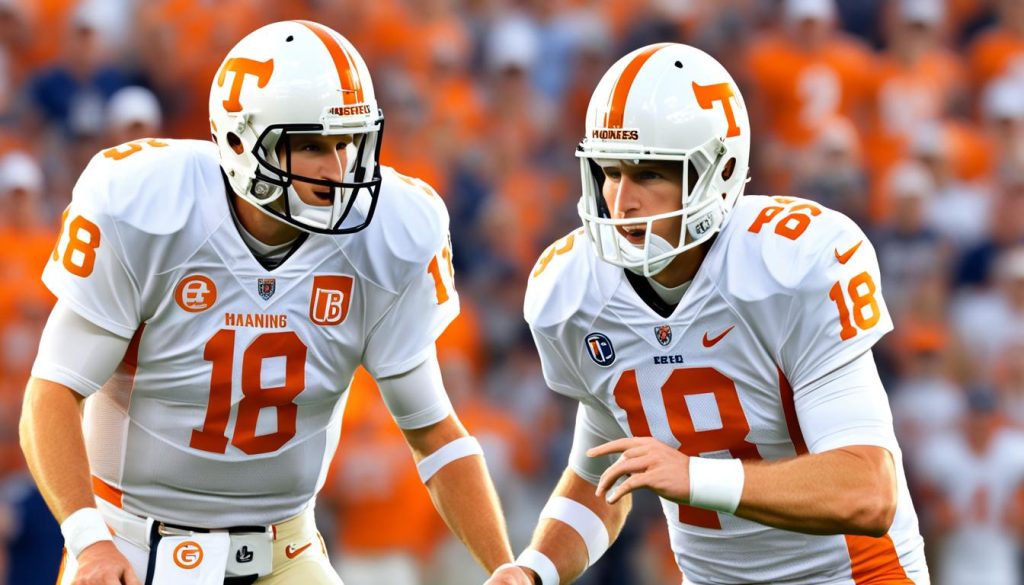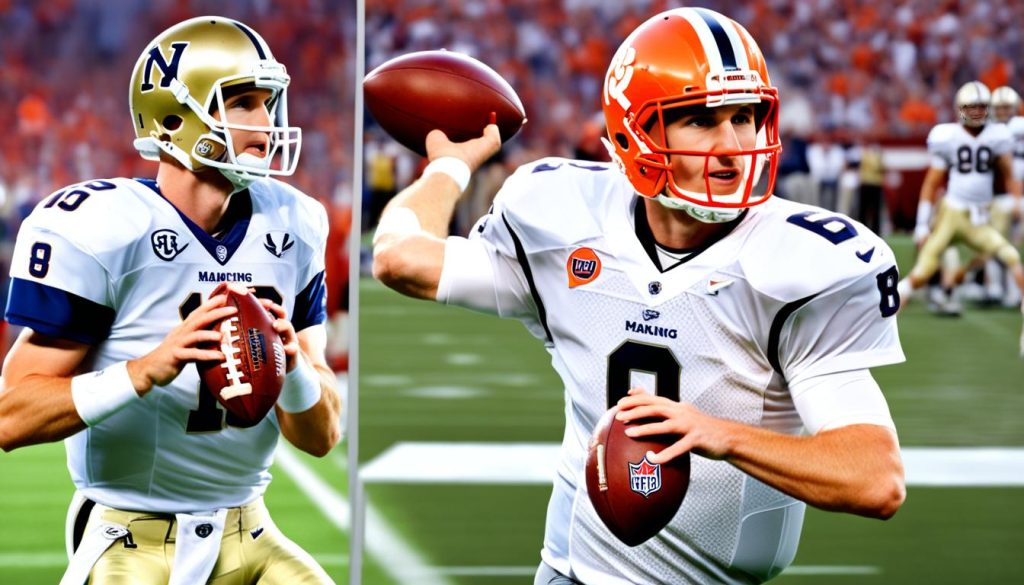Peyton Manning vs. Drew Brees: Who Was the Better Quarterback of the 2000s?
Did you know that during a memorable Monday Night Football game in October 2018, Drew Brees surpassed the towering record of Peyton Manning’s 71,940 career passing yards? Both of these quarterbacks are makers of history, vital components of the golden era for quarterbacks in the NFL. They are not only NFL legends but also iconic mascots of American football in the 2000s. Their record-breaking achievements, face-offs, and Super Bowl confrontations have left us all questioning: Who exactly was the superior quarterback – Drew Brees or Peyton Manning?
Key Takeaways
- Peyton Manning and Drew Brees, both 2000s NFL icons, have made significant contributions to the sports industry with their incredible quarterback achievements.
- Over their careers, each has surpassed the other in an ongoing cycle, keeping fans and critics speculating on which of the two is the better quarterback.
- Both quarterbacks have surpassed 70,000 career passing yards, a testament to their skill and longevity in the NFL.
- Although both retired now, their records and achievements continue to inspire and set benchmarks for current NFL players.
- Comparing these NFL legends helps to underline the evolution and progress of the game in the modern era.
The Road to NFL Stardom: Early Years and College Careers
The journey to becoming an NFL icon often begins far from the spotlight of NFL draft day, on the fields of high school football. The promising talents of high school football players often catch the eyes of college scouts and cultivate dreams of someday joining the NFL. This early stage was integral for two of the sport’s legends, Peyton Manning and Drew Brees. Their standout college careers at the University of Tennessee and Purdue University, respectively, paved their paths to the NFL.

Peyton Manning: A Prodigy from the Start
Peyton Manning was already a household name in Louisiana due to his father Archie Manning’s NFL legacy. He received national honors and major college recruitments out of high school, setting the stage for his future dominance. Manning chose to attend the University of Tennessee, where he soared as a player and presented himself as an NFL-bound quarterback. His collegiate career is marked by multiple accolades, including First Team All-American honors. Manning set numerous Tennessee and SEC records, notably his 89 career touchdown passes, which stood the test of time as a conference record.
Drew Brees: Overcoming the Odds
Despite facing adversity due to his stature, Drew Brees demonstrated an insatiable drive to excel. He played for Purdue University in the Big Ten Conference, where his performance earned him the recognition as the Big Ten Offensive Player of the Year twice. Leaving a profound impact on Purdue, Brees set records that still stand for passing yards and touchdowns. His skill, determination, and leadership were recognized nationally, as he was named a finalist for the Heisman Trophy during his college career.
Their standout performances served as their ticket to the NFL. Peyton Manning was the first overall pick in the 1998 NFL Draft by the Indianapolis Colts, while Drew Brees was chosen in the second round of the 2001 NFL Draft by the San Diego Chargers. These selections launched their respective legendary careers, with each leaving an indelible imprint on the sport.
Peyton Manning vs. Drew Brees: Comparing Career Beginnings
The illustrious careers of both Peyton Manning and Drew Brees were marked by interesting parallels and distinct contrasts starting right from their rookie seasons. Their first years in the NFL not only shaped their future trajectories, but also positioned them among the elite starting quarterbacks of the time.
Peyton Manning’s induction into the NFL was like stepping into destiny. The first year saw him being instantly thrust into the role of starting quarterback for the Indianapolis Colts. Even though he faced a barrage of interceptions accompanied by team losses, Manning’s resilience and skills soon shone through as he steadily enhanced his game intelligence and demonstrated not just potential, but profound capability.

On the other side of the spectrum, Drew Brees’s rookie season was markedly quieter. Starting off as a backup to Doug Flutie in his rookie year, Brees eventually took over as the Chargers’ starting quarterback in his second season. His career high point arrived in 2004 when, overcoming challenging circumstances, he clinched the NFL Comeback Player of the Year Award and made his first of many Pro Bowl selections. Moreover, he carried this momentum forward, consistently demonstrating his arm strength and replicating his high school success on the vast landscape of the NFL.
Showcasing the breadth and depth of their careers, the detailed table below helps to visualize the rookie season records of both players, offering insight into just how these two quarterbacks embarked on their incredible journeys:
| Peyton Manning (1998) | Drew Brees (2001) | |
|---|---|---|
| Started Games | 16 | 1 |
| Touchdowns | 26 | 1 |
| Interceptions | 28 | 0 |
| Passing Yards | 3,739 | 221 |
| Completions | 326 | 15 |
| Attempts | 575 | 27 |
| Completion Percentage | 56.7% | 55.6% |
From humble rookie seasons to remarkably consistent and high-achieving careers, Manning and Brees went on to set numerous records and create unforgettable NFL moments, thereby cementing their status as two of the finest quarterbacks of their generation.
Decade Dominance: NFL Quarterbacks Comparison
In the realm of NFL quarterbacks, the statistical prowess of both Drew Brees and Peyton Manning spark awe and debate across enthusiasts and analysts. Their numbers throughout their tenure paint a vivid picture of dominance, influencing the landscape of the sport for over a decade. Let’s delve deeper and unravel the impact they had and the records they set during their prime.
Breaking Down the Career Stats
Both Brees and Manning left a mark on NFL history with their impressive statistics that led to multiple awards and recognition. Brees’s career is adorned with staggering completion percentages and passing yards, even surpassing 5,000 yards multiple times. It’s these remarkable achievements that earned him accolades such as the Offensive Player of the Year. In terms of passing completions, yardage, and touchdowns, Drew Brees holds an exceptional record.
Manning’s career stats mirror this effectiveness. His pursuit of excellence, demonstrated in numerous MVP awards, Pro Bowl selections, and All-Pro recognitions, are evidence of his lasting impact on the game. Manning’s track record is nothing short of extraordinary, showcasing his prowess both as an exceptional player and a team leader.
| Peyton Manning | Drew Brees | |
|---|---|---|
| Passing Yards | 71,940 | 80,358 |
| Passing Touchdowns | 539 | 571 |
| Super Bowl Titles | 2 | 1 |
| Season Records | 14-2 (2005, 2009) | 13-3 (2009, 2011, 2018) |
| Offensive Player of the Year | 0 | 2 (2008, 2011) |
Assessing the Impact of Super Bowl Wins
While numbers and awards offer a crucial perspective, the ultimate test of a quarterback’s greatness often comes down to the number of Super Bowl titles won. Manning managed to clinch two Super Bowl wins, one with Indianapolis Colts in 2006 and another with Denver Broncos in 2015. Brees, on the other hand, led the New Orleans Saints to their first Super Bowl victory in 2009, earning the Super Bowl MVP award in the process. Each Super Bowl triumph underscored the quarterbacks’ ability to excel under pressure and uplift their teams in crucial moments, a testament to their overwhelming influence on the game.
The Impact of Supporting Casts on Manning’s and Brees’s Careers
Many NFL aficionados would agree that having a reputable NFL supporting cast is instrumental for team success and can significantly leverage the performances of high school quarterbacks transitioning into the NFL. Despite their independent prowess and impressive capabilities, both Peyton Manning and Drew Brees tremendously benefitted from the backing of formidable teammates throughout their illustrious careers.
Manning, who spent the majority of his career with the Indianapolis Colts, was privileged to collaborate with other future Hall of Famers such as wide receivers Marvin Harrison and Reggie Wayne, as well as dynamic running back Edgerrin James. These offensive weapons, each a force to reckon with, played pivotal roles in bolstering Manning’s passing game and accelerating the evolution of the Colts into a championship-contending team.
Resembling Manning’s experience, Brees also enjoyed the support of an esteemed ensemble of teammates during his tenure with the New Orleans Saints. Renowned NFL figures like wide receiver Michael Thomas and dynamic running back Alvin Kamara were instrumental in Brees’s ascent to becoming one of the NFL’s top quarterbacks. Their contributions highlighted the significant impact of having a competent supporting cast, fortifying Brees’s exceptional passing skills, and setting numerous NFL records.
Several statistics illuminate the profound impact these wide receivers and running backs had on Manning’s and Brees’s NFL records and team success:
| Peyton Manning | Drew Brees | |
|---|---|---|
| Regular Season Win-Loss Record | 186-79 | 172-114 |
| Total Passing Yards | 71,940 | 80,358 |
| Total Passing Touchdowns | 539 | 571 |
| Super Bowl Titles | 2 | 1 |
The supportive contributions of these offensive weapons were not only beneficial in augmenting the performances of both quarterbacks but also in fostering their teams’ successes. Furthermore, their collective efforts served as a testament to the fact that even iconic players such as Manning and Brees required an ironclad supporting cast to clinch victory on the gridiron.
Legacy and Hall of Fame Chances: Who Stands Taller?
As we delve deeper into the NFL careers of Peyton Manning and Drew Brees, it’s imperative to take a closer look at their overall impact in the game to determine who has left a more lasting legacy. Both players have racked up monumental statistics that clearly place them in the echelons of the all-time greats. Their potential Hall of Fame chances are undeniable, boasting individual awards, quarterback legacies, and Pro Bowl, and Super Bowl MVP honors. The crux of this comparison, however, lies in a scrutiny of the distinctive characteristics that set them apart in the realm of American football.
The Debate for All-Time Greats Status
Peyton Manning, known for his uncanny ability to orchestrate game-winning drives, sets the bar high for quarterback greatness in NFL history. His stunning repertoire includes an unmatched collection of five MVP awards. Manning’s playmaking brilliance is likely to leave an indelible impression on the hall of fame selectors. Drew Brees, on the other hand, encapsulates consistency and precision like few have managed to do in the modern era. His knack for threading touchdown passes game after game resulted in record-shattering performances, including the longest streak of games with a touchdown pass.
Reviewing Individual Awards and Recognition
When it comes to individual awards and recognition, both players have had their fair share of commendations. Manning’s resume lights up with its unrivaled five-time MVP status. Brees was no underachiever either. His roles in the New Orleans Saints’ Super Bowl triumph and his perennial Pro Bowler status are testaments to his courageous performance and leadership. While the debate rages on, one cannot deny the colossal influences that both quarterbacks have imparted on the game, even as we continue to compare and rank their illustrious careers.
